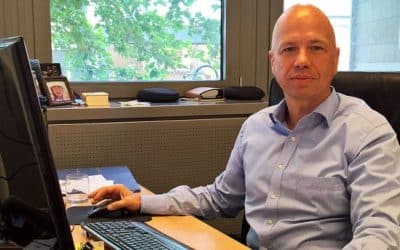Arnd Baranowski studied aerospace engineering in college. He attained the level of a master of science degree from Universität der Bundeswehr München, the university of the German Armed Forces. After graduation he remained with the German Army and was a professional career officer for 20 years.
A good bit of Baranowski’s university study included programming, and it became a hobby for him during his time in the army. He developed a system for real estate agents that was relatively successful, and this success with systems development prompted him to leave the military to pursue a career in programming and application development. “I always knew that one day I would run my own technology company, which is exactly what I did when I finished my career in the army,” he explains.
At a friend’s urging, Baranowski went into the telecommunications business, founding and bootstrapping the company Oculeus in 2004. His company started by developing an OSS/BSS (operation support system/business support system) solution for telco operators in the area of interconnect wholesale. This system met with good success, and clients asked Baranowki to have his company develop solutions in different areas. “Where we thought it could make sense, we really went into it,” says Baranowski.
One area that Oculeus is tackling is fraud detection in the telecom business. In the U.S. alone, fraud in this industry totals more than $15 billion a year. Most of the time, the victim of this type of fraud is the telco operator, but occasionally the customer can be liable for the losses. Either way, the customer ends up paying for losses or for higher bills that telcos pass along to cover their losses.
In the telecom industry, fraud occurs on an existing connection; it is not about breaking into a connection or breaking into a network. In one form of fraud, someone hijacks a communication entry or a communication line and they inject traffic to high cost destinations, such as Africa. The fraudster who hijacked the line can sell access to that line and he doesn’t have to pay the bill on sending calls. So, he is collecting revenue on a line that he has no right to use. The victim in this case is the telco operator that actually moves the call traffic but collects no revenue for it.
Baranowski says his own company was once a victim of telecom fraud, even though Oculeus is not a telco operator. “Our company has been hit by fraud through our regular PBX system,” he says. “Someone hacked our PBX on a weekend. Several hundred hours of calls were injected into the network of the operator on which we have our PBX running. The damage at that point was €13,800, as our operator connected the calls to places in Africa and Europe. The cost in this case would either sit with the operator or with us, but not with the one who injected the calls into our system.”
Since then, Baranowski’s company has developed a way to quickly detect this type of fraud. “Detecting fraud is based on statistical evaluations of call data records. The point here is to get it to a level where you can understand within seconds or minutes that what is currently ongoing is fraudulent in order to stop it,” he says. “For example, in our case there were several hundred hours’ worth of calls which did go to certain countries. This happened on a weekend when no one was monitoring the system. On the first day of the work week we were told by the operator that there had been a fraud case against us. It ran for two days before it was stopped. But if the system we have now developed had been in place then, there would have been a maximum of two or three minutes of fraudulent communication, and that would have cost all of about 20 cents.”
This solution can help enterprises prevent fraud on their PBX systems. This is important because an operator might be willing to absorb the cost of the fraud the first time it happens, but if another instance occurs, the operator could easily pass the cost back to the customer if it did little to prevent the abuse the second time around.
Baranowski has grown his company to a global operation based out of Frankfurt, Germany with over 120 customers. Oculeus operates in multiple geographies and in various vertical market segments. Baranowski is enormously proud that he has grown his company without any external investors or even a line of credit from a bank. He is focused on running his business accordingly. “My management style is to hire the right people and let them work as independently as possible. They have to be highly intuitive and have a 100% understanding of what they’re doing and who is actually using their systems. They have to be very focused on what our customers need. My experience is that this empowers individuals to fulfil their potential and produces strong results.”
On the personal side, Baranowski is married, and he and his wife have a daughter. He enjoys running and swimming to keep fit, and he flies remote control aircraft as a hobby to escape the demands of his work.

